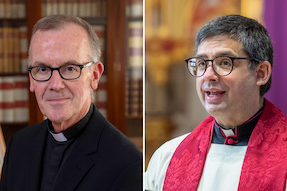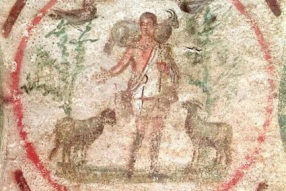Atheism debated

Richard Harries, former Bishop of Oxford, and Charles Moore, a former editor of the Daily Telegraph and Spectator debated atheism with two of its key proponents at Crowthorne in Berkshire on Sunday.
In a debate organised by Intelligence Squared, they argued in favour of the motion that atheists represent the new fundamentalists, while Richard Dawkins and A C Grayling argued in opposition. While Harries and Moore lost the debate, they managed to persuade a good number of undecided attendees.
Harries began by expressing the deepest respect for the type of atheism expressed by Camus in La Peste and by Ivan in Dostoyevsky’s The Brothers Karamazov which he felt haunts believers perhaps even more than unbelievers. He saw in that sort of atheism an all too plausible view of the universe. However in recent years had emerged a more strident form of atheism, and it was especially regrettable to Harries that his friend Richard Dawkins was one of its key proponents.
Given that for too long religion had taken the moral high-ground, the new atheism was right to attack it on these terms, but not to claim the intellectual high-ground. Harries who had debated with Grayling in August as part of Radio 4’s series The Atheist and the Bishop, defined the key characteristics of fundamentalism as being an imperviousness to the facts, a focus on the weakest rather than the strongest points in an opponents arguments, and a misrepresentation of their beliefs. These vices had all their equivalents in the writings of Dawkins, Grayling and others. The danger is that atheistic and religious fundamentalism feed off one another. Commenting on passages in The God Delusion where Dawkins points out that many members of Mensa are atheists and that scientists are bored with what they know, Moore detected the threat of a devaluation of the poor, sick and disabled. He contrasted this with the Christian message in which the poor are raised high and the last shall be first.
Grayling contended that after 9/11 it has no longer become acceptable to simply respect an individuals religious beliefs given the appalling consequences that can stem from them. He had three key objections. Firstly, he disliked the term ‘atheism’ for giving validity to a theistic worldview. Secondly, while religious people can be secularists, religious organisations have a very privileged place in society. Thirdly, many atheists are humanists but religious bodies present themselves as the sole authority on ethics and morality. Both Grayling and Dawkins affirmed that since atheists do not have a fixed dogma, , it is very hard for them to be fundamentalists.
When challenged by an atheistic audience member who believed that religion has had an enormously beneficial effect on society and individuals, Grayling argued that many religious tenets are largely unliveable and that others derive from classical traditions. Dawkins affirmed that the last 2,000 years would have been better without Christianity,
Before the debate, 334 attendees voted in favour of the motion, with 675 against and 389 undecided. Afterwards, 363 voted in favour of the motion, with 1070 against it and 85 undecided.
This was the first Intelligence Squared debate to take place at Wellington College but it was also watched online with viewers invited to twitter in questions. It can be found at www.intelligencesquared.com.


















